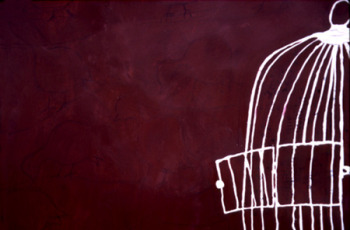 Painting by Julie AlleyI have listened to inner voices for as long as my brain has had the ability to remember, recall, and, unfortunately, deliver psychological sucker punches. That is to say, for most of my life. The voices are debilitating. Most often laced with venom, despicable and cruel in all manner of punishing remarks, the voices that speak to me are old demons to whom I willingly lend an ear over and over again. The monologue is destructive and poisonous. This admission should not strike you as odd or maniacal, for I am convinced they are present in each of us. We lean in and listen, believing the voices to be true.
Painting by Julie AlleyI have listened to inner voices for as long as my brain has had the ability to remember, recall, and, unfortunately, deliver psychological sucker punches. That is to say, for most of my life. The voices are debilitating. Most often laced with venom, despicable and cruel in all manner of punishing remarks, the voices that speak to me are old demons to whom I willingly lend an ear over and over again. The monologue is destructive and poisonous. This admission should not strike you as odd or maniacal, for I am convinced they are present in each of us. We lean in and listen, believing the voices to be true.
They are with me from the moment I awake: as I brew a pot of coffee, each time I lose patience with my kids, when I see my stubbled face in the mirror, when I peek at my bank account balance, when I scrape my knuckle working on a project, when I am unable to make eye contact with another human in my perceived inferiority, until the moment I finally lay my head on the pillow at day’s end. Sadly, they are loudest when I write, when I seek to string together words and bring something beautiful into the world. Perhaps you will identify with these refrains:
You’re a terrible parent.
You’re a fraud. Who do you think you are pretending to be a writer?
Idiot, you’ve completely forgotten how to write a song. You’ll never write another song the rest of your life.<
Look at your friends succeeding in their careers. What have you accomplished in life? Nothing memorable. Quit wasting yours and other people’s time. Your dreams are over. Get a real job.
You are utterly forgettable.
The humiliating dialogue is relentless.
Sadly, for the vast majority of my life thus far, I have mistaken the voices as those emanating from heaven. Yes, it struck me as odd, two-faced even, that the same Great Hope who promised peace would emotionally pummel me in my failures, in my wrestling, lording it over me in my weakest, most shameful and fragile moments.
But I was fully convinced that, painfully humiliating and utterly devoid of gentle dignity though they were, those very same voices were of “loving” spiritual discipline and correction. I wanted rest, but there was no rest in guilt. I wanted peace, but there was no surpassing peace with salt continually searing old wounds. I wanted grace, but grace was only for those worthy of it. Henceforth, I am retraining the garden of my mind, pulling weeds, tilling new rows, clearing undergrowth, inviting light into the innermost recesses. Everything I thought I knew of God I am seeking to unlearn. Not because he is different or is less — far be it — but because everything I ever perceived of his character was in truth shy of actual truth, bullet-riddled by my own staunch arrogance, soldered in fear, misdirection, and misperception.

Unlearn that a voice reverberating anything but grace, quiet dignity, and edification can be that of I Am. Unlearn the arrogant presupposition that we have no need for a savior. Unlearn that there is shame associated with having to make ends meet through supplemental labor for the sake of keeping a roof over our family’s heads and food on the table. Unlearn that fame and respect are one in the same. Unlearn that God cannot handle our anger. A curse can become a blessing. The voices, of course, would have us believe otherwise. The same creator who appointed a fish to swallow and save a seaweed-entangled, drowning man from the tempest’s undertow — Jonah’s own rage — and where, ultimately, from inside the acidic stew of the fish’s belly, a changed and new human emerged, mercifully vomited upon dry land. Still, through all that, stinking and smelly Jonah found reason to be angry with God. Outside Nineveh’s gates, surly, pouting and muttering expletives while listening to and talking with his inner voices, Jonah found shade beneath the Lord’s leaf, surviving on crumbs dropped in his lap by ebony crows roosting nearby. Jonah, after all, was never alone, never abandoned, never left to his own devices. Nor are we.
It is easy, with our lips, to speak of God in terms of grace, mercy, forgiveness, gentleness, humility, worthy of adoration. All are true. But when the lights go down and it’s you against you, the voices we lean into more than likely possess none of these traits. Instead, they bear down on us with such guilt, shame, and gravity that no human can withstand as uncompromising a burden as the loud and foul echoes spoken into the space between our ears. The voices that approach as tempests, wreaking havoc, are merely the facsimile, bastard gods unworthy of our attention. They are the son-of-a-bitch agents — as my counselor refers to them — who seek nothing shy of our demise, creating a rift so vast between perception and glorious reality that we can no longer tell the difference between land and sky, between lily and weed, between hope and disaster, between a voice still and small and voices vile and ruinous.
Eric Peters lives in a hole in the ground with his myriad house pets, pair of cackling ganders, and a servant serpent named Musket. Eric spends his days fireside sipping cafe au lait while whittling, doodling, or dawdling (in no particular order). He jogs, barefoot, nine miles per day, and he prefers a wild lawn.
False.
Eric lives in a quiet historic neighborhood in east Nashville with his wife, Danielle, and their two boys, Ellis and Monroe. When he's not tending to his burgeoning lawn care business, he writes and records songs, and sings them to unsuspecting folks. When he's not doing that, he ponders weird things. Eric enjoys manicuring lawns, and he absolutely hates snakes.















